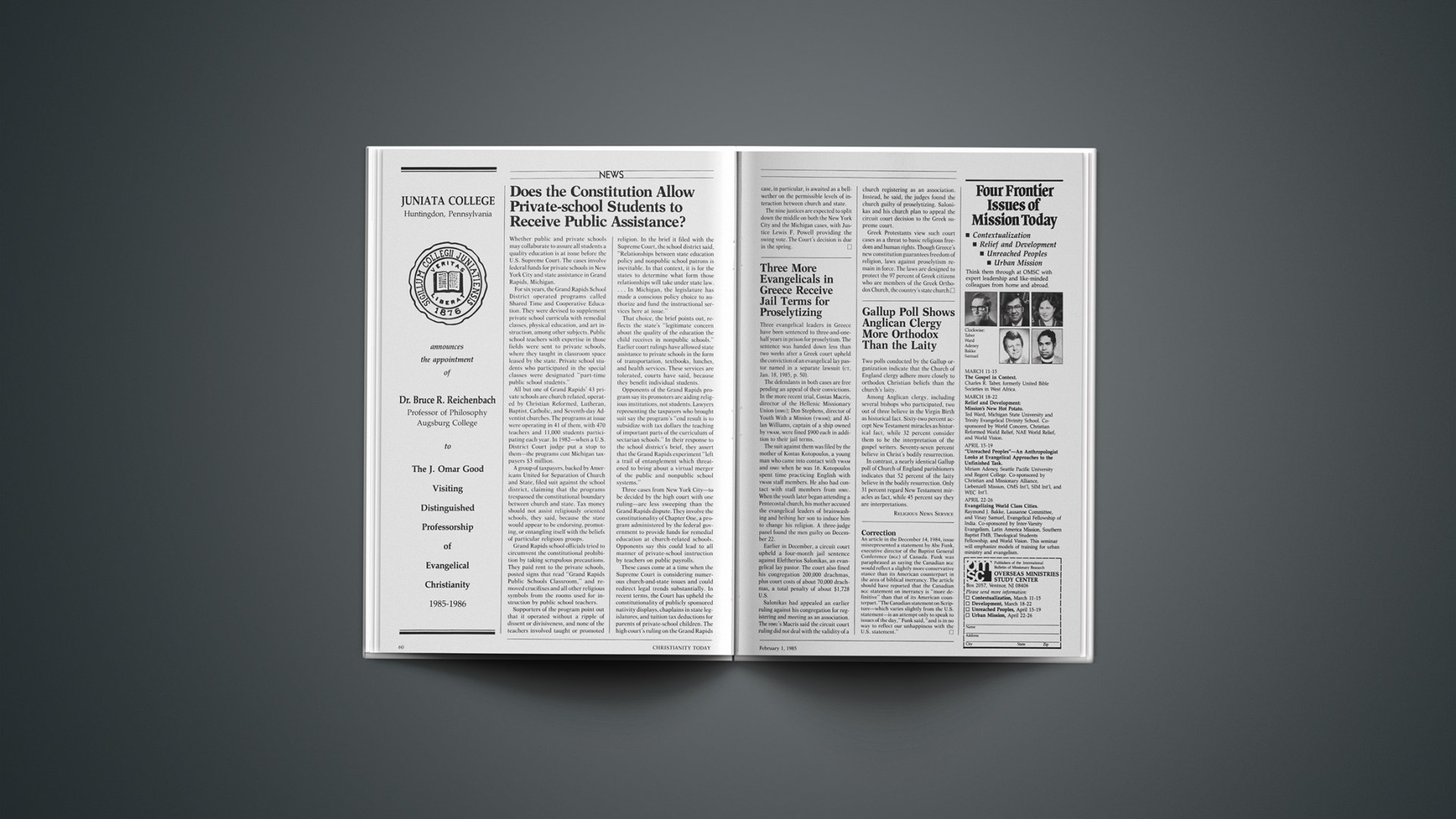Whether public and private schools may collaborate to assure all students a quality education is at issue before the U.S. Supreme Court. The cases involve federal funds for private schools in New York City and state assistance in Grand Rapids, Michigan.
For six years, the Grand Rapids School District operated programs called Shared Time and Cooperative Education. They were devised to supplement private school curricula with remedial classes, physical education, and art instruction, among other subjects. Public school teachers with expertise in those fields were sent to private schools, where they taught in classroom space leased by the state. Private school students who participated in the special classes were designated “part-time public school students.”
All but one of Grand Rapids’ 43 private schools are church related, operated by Christian Reformed, Lutheran, Baptist, Catholic, and Seventh-day Adventist churches. The programs at issue were operating in 41 of them, with 470 teachers and 11,000 students participating each year. In 1982—when a U.S. District Court judge put a stop to them—the programs cost Michigan taxpayers $3 million.
A group of taxpayers, backed by Americans United for Separation of Church and State, filed suit against the school district, claiming that the programs trespassed the constitutional boundary between church and state. Tax money should not assist religiously oriented schools, they said, because the state would appear to be endorsing, promoting, or entangling itself with the beliefs of particular religious groups.
Grand Rapids school officials tried to circumvent the constitutional prohibition by taking scrupulous precautions. They paid rent to the private schools, posted signs that read “Grand Rapids Public Schools Classroom,” and removed crucifixes and all other religious symbols from the rooms used for instruction by public school teachers.
Supporters of the program point out that it operated without a ripple of dissent or divisiveness, and none of the teachers involved taught or promoted religion. In the brief it filed with the Supreme Court, the school district said, “Relationships between state education policy and nonpublic school patrons is inevitable. In that context, it is for the states to determine what form those relationships will take under state law.… In Michigan, the legislature has made a conscious policy choice to authorize and fund the instructional services here at issue.”
That choice, the brief points out, reflects the state’s “legitimate concern about the quality of the education the child receives in nonpublic schools.” Earlier court rulings have allowed state assistance to private schools in the form of transportation, textbooks, lunches, and health services. These services are tolerated, courts have said, because they benefit individual students.
Opponents of the Grand Rapids program say its promoters are aiding religious institutions, not students. Lawyers representing the taxpayers who brought suit say the program’s “end result is to subsidize with tax dollars the teaching of important parts of the curriculum of sectarian schools.” In their response to the school district’s brief, they assert that the Grand Rapids experiment “left a trail of entanglement which threatened to bring about a virtual merger of the public and nonpublic school systems.”
Three cases from New York City—to be decided by the high court with one ruling—are less sweeping than the Grand Rapids dispute. They involve the constitutionality of Chapter One, a program administered by the federal government to provide funds for remedial education at church-related schools. Opponents say this could lead to all manner of private-school instruction by teachers on public payrolls.
These cases come at a time when the Supreme Court is considering numerous church-and-state issues and could redirect legal trends substantially. In recent terms, the Court has upheld the constitutionality of publicly sponsored nativity displays, chaplains in state legislatures, and tuition tax deductions for parents of private-school children. The high court’s ruling on the Grand Rapids case, in particular, is awaited as a bellwether on the permissible levels of interaction between church and state.
The nine justices are expected to split down the middle on both the New York City and the Michigan cases, with Justice Lewis F. Powell providing the swing vote. The Court’s decision is due in the spring.










